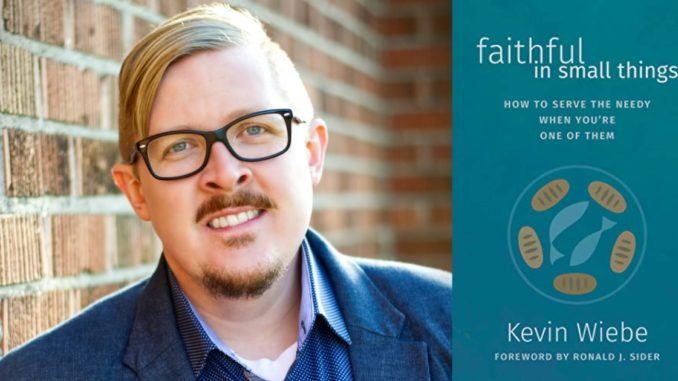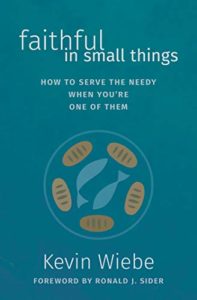
Podcast (beyond-the-page): Play in new window | Download
Subscribe: Apple Podcasts | RSS
How do you give generously when you’re in need yourself? Kevin Wiebe’s Faithful in Small Things looks at a side of generosity and poverty alleviation that’s often not considered. What if poverty relief was best done in community with the poor? Wiebe’s personal and professional experience with poverty and generosity has taught him how to be faithful with what God has given him and shown him the need for strong communities that hold each other up in times of need. Listen in as Beyond the Page host Josh Olds talks with Kevin about Faithful in Small Things.
The Interview | Faithful in Small Things by Kevin Wiebe
This interview excerpt has been lightly edited for clarity and conciseness.
Josh Olds: Let’s begin with why you felt compelled to write this book?
Kevin Wiebe: Yeah, well, it’s kind of the intersection of a few things. For me, it’s a topic where I have a lot of personal stories and experience, the stuff that I’ve lived both growing up in a context where money was not overly abundant, and also an area where I’ve studied a lot, and something that just means a lot to me. It’s something I try to live out as well, in terms of helping other folks out as an individual and also as a church community, and as a leader in a church community. And so with all of those kind of factors playing into it, it just seemed very natural to write about that as my first book.
Josh Olds: One of the things that really drew me to Faithful in Small Things was that it talks about giving when you are someone who also might be a person that needs assistance. We tend to have this idea that there’s a social strata of people who need help and the people who are the helpers, and this sort of reconstructs that entirely, and instead says, “No, you have the ability to help other people. And you have the ability to be a part of a community where everyone is interdependent on one another, you don’t have to just rely on people who are more financially well off than you.” And this, I think, surely changes the way in which we look at poverty and poverty alleviation. So how do we begin to shift that paradigm from what we might typically see?
Kevin Wiebe: Yeah, that’s a good question. It’s, definitely a really kind of big thing to do. And there’s a couple things we got to be careful about as we do this. One is when we view those in poverty as helpless, we do them a disservice. Right? And that whole kind of God complex people have is so unhealthy when trying to reach out to those in need. But yet, there’s also, on the flip side, if we kind of go to the other extreme of looking at people in poverty and thinking, “Well, these are your problems and I don’t need to help you,” that’s also a kind of toxic approach, as well as a means of dismissing people. But there’s this space where we can meet in the middle or where we where we can meet one another, not as dismissing one another, not as saying, you know, I have all the answers or you need to deal with your own problems or all that but where we can encounter each other as fellow human beings.
Poverty is a series of broken relationships. And, and in those broken relationships, we experienced poverty in different ways. And it can be relational poverty, it can be spiritual poverty, it can be financial poverty. And so in these broken relationships, then when we recognize the poverty within ourselves, we come to a place of seeing, well, someone else has less money than me, and they’re in need in this very particular way. But, you know, I’m also broken in a different way. So I can’t have a God complex as I approached them, because that would just be kind of hypocritical and, and just be something fake and phony anyway. So then we develop a kind of humility within ourselves as we approach this topic, and as we approach helping. So let’s do what we can to help each other out, also do what we can to learn from each other.
The Book | Faithful in Small Things
Read the full Life is Story review here.
Pastor Kevin Wiebe grew up below the poverty line, with his mother hunting for change in the couch to buy food for the baby. Wiebe now pastors a “low-resource” church of mostly immigrants—a congregation that transcends definitions of the helper and the helped and that doesn’t fit neatly into any stereotype of poverty. In Faithful in Small Things, Wiebe shows readers that writing big checks isn’t the only—or even the best—way to alleviate poverty. Along the way, he shines a spotlight on the value of small acts of love as a means of changing the world, and as vitally important to following Jesus.
Investigating scriptural definitions of poverty and God’s heart for the poor throughout the Bible, Wiebe calls readers not only to “help the needy” but to acknowledge their own need and to work with God to serve others. By delving into concepts like brokenness, mutuality, dignity, and systemic injustice, Wiebe exposes gaps in the mainstream Christian understandings of economic inequality and explores holistic ways of reducing poverty. In doing so, he provides a better way forward for Christians committed to working for the flourishing of all.
Jesus ministered to the poor; Jesus was poor. If both are true of our Savior, both can be true of us too.
The Author | Kevin Wiebe
 Kevin Wiebe is an Anabaptist writer, pastor, and the creator of Pov.ology, a small-group curriculum on poverty and the church that has been used around the world and featured in publications across the U.S. and Canada. Wiebe grew up among the working poor, with parents who had a standing family rule that “there is always room for one more,” even as they struggled to get by themselves. He is senior pastor of New Life Christian Fellowship in Stevenson, Ontario, a rural congregation whose members are primarily Mennonite immigrants from Mexico. He has degrees from Providence University College and Conrad Grebel University College and is an ordained minister in the Evangelical Mennonite Conference. He and his wife, Emily, have three children.
Kevin Wiebe is an Anabaptist writer, pastor, and the creator of Pov.ology, a small-group curriculum on poverty and the church that has been used around the world and featured in publications across the U.S. and Canada. Wiebe grew up among the working poor, with parents who had a standing family rule that “there is always room for one more,” even as they struggled to get by themselves. He is senior pastor of New Life Christian Fellowship in Stevenson, Ontario, a rural congregation whose members are primarily Mennonite immigrants from Mexico. He has degrees from Providence University College and Conrad Grebel University College and is an ordained minister in the Evangelical Mennonite Conference. He and his wife, Emily, have three children.
